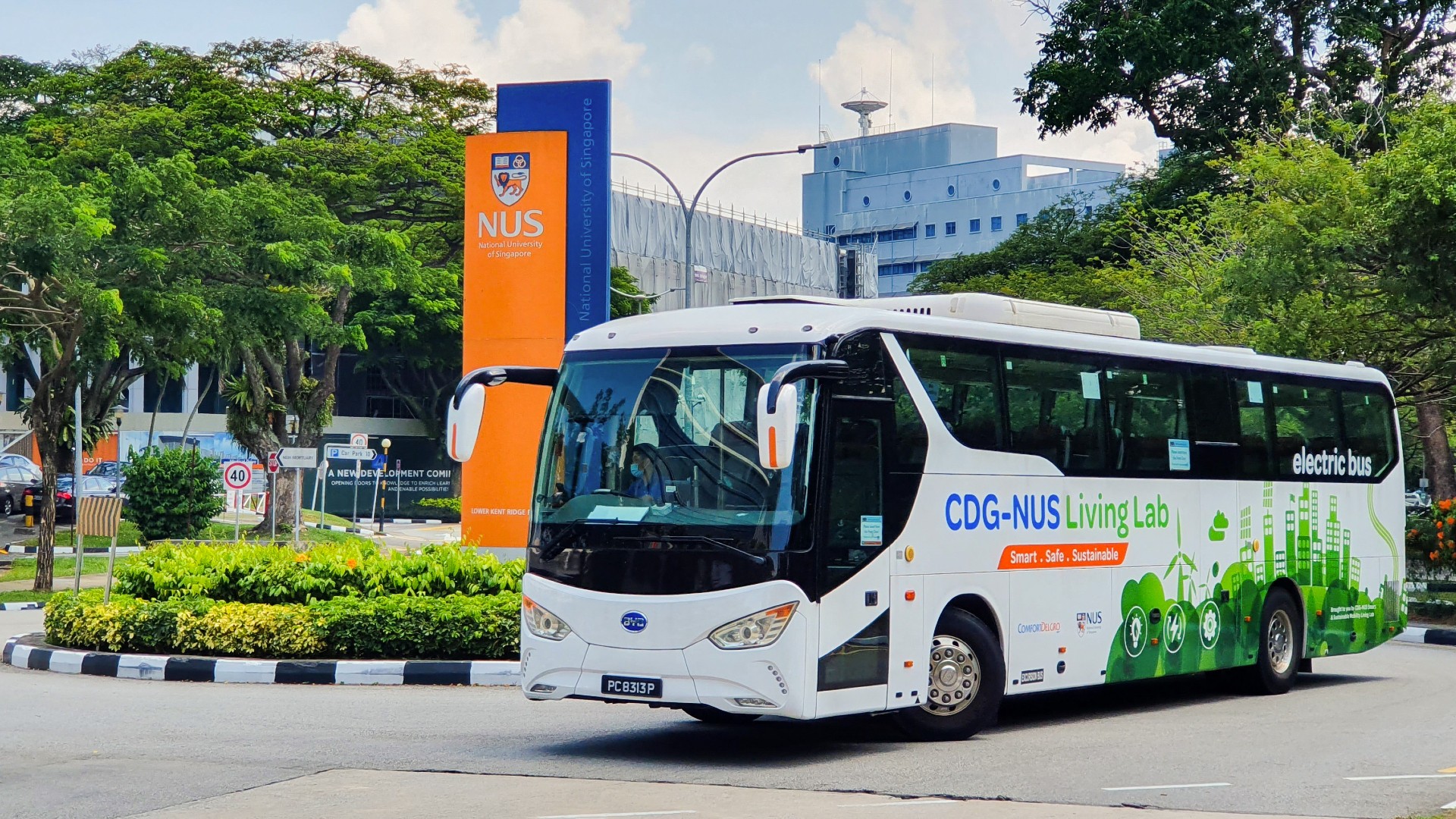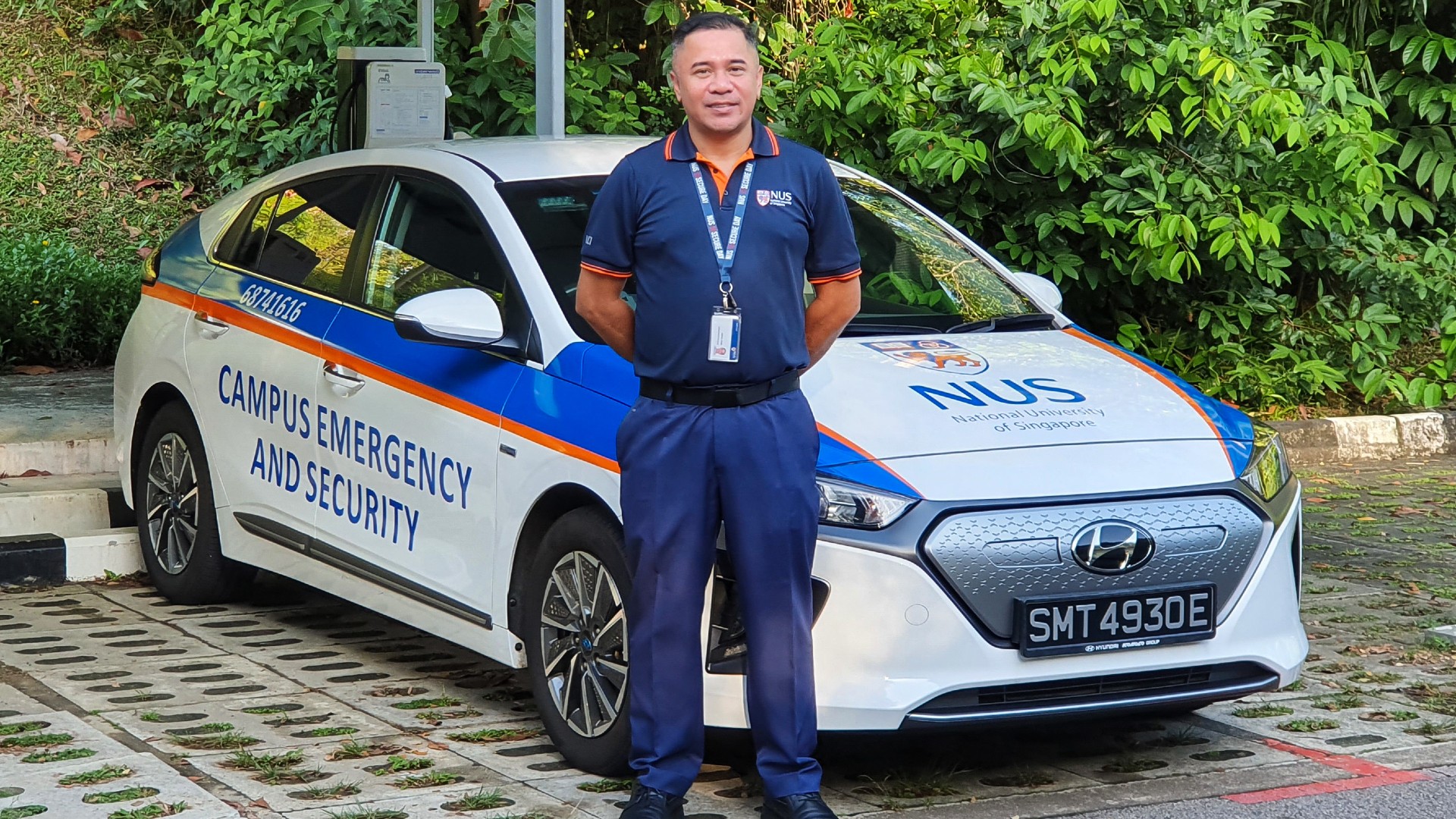Transforming campus mobility through electrification
NUS’ Internal Shuttle Buses on campus to go fully electric, with three-door design to improve commuter flow.
There’s something different about some of the Internal Shuttle Buses (ISBs) whizzing around NUS campuses this month – they’re smoother, quieter, and fully electric!
In line with the University’s commitment to achieve carbon neutrality by 2030, the Campus Services team of the Office of University Campus Infrastructure (UCI) has begun the process of electrifying NUS’ ISB fleet. Two electric buses have been plying the NUS campuses since the beginning of August 2022, and the full fleet of electric ISBs is slated to be operational by the end of this year. This is well ahead of Singapore’s national target to electrify half of the country’s public bus fleet by 2030.
The introduction of fully electrified buses is also a boon for commuters on campus. For example, the electric buses that will be on the road by end-2022 will be equipped with three doors instead of two, facilitating more efficient passenger movements and reducing dwell times at bus stops. Keeping up with the latest technology, NUS’ electric buses are also built with advanced features, including an automatic passenger counting system, advanced driver assistance system, and telematics system.
The telematics system tracks vital data about the vehicle’s motion, utilisation, and condition to help Campus Services better optimise ISB operations and respond more dynamically to changes and disruptions. It will also monitor driving behaviours to generate safety scores, which will be funnelled back to drivers to help them improve their driving skills and safety awareness.
Mr Sng Jin Soon, Director of Campus Services at NUS, said, “The electrification of NUS’ ISB fleet is a vital step in the University’s overall decarbonisation journey. It reflects not only our commitment to cut emissions and reduce our carbon footprint, but also our dedication to the digital transformation of NUS’ mobility services.”
Charging ahead to a greener campus fleet
Apart from internal shuttle buses, NUS is also aiming to electrify its entire fleet of in-house vehicles – including pickup trucks, vans, patrol cars and staff cars – by 2030. Some departments have already adopted electric vehicles (EVs): the University’s Campus Emergency and Security (CES) department, for example, began deploying fully electric Hyundai Ioniq sedans for campus patrolling purposes in June 2020.
Employees such as Mr Syahman bin Ahmad, a Senior Security Specialist, now prefer driving EVs, as these cars generally make for smoother patrols, releasing neither pollutants nor noise. Mr Syahman’s previous concerns related to the operating of EVs, such as range and safety, have also been laid to rest – the Ioniq can be driven up to 300km on a single charge, and is equipped with comprehensive safety features such as blind spot collision warnings and lane handling assist systems.
“I also like that fuel stops to the petrol station to refuel the car are no longer required with the electric vehicle, as charging points are located within the campus carpark,” said Mr Syahman.
To encourage private EV adoption among NUS’ wider community of staff and students, the University will also install up to 600 charging points across 3,900 parking lots within NUS campuses by 2030. Some car parks such as those in University Hall and the College of Design and Engineering (CDE) will have charging points by the fourth quarter of 2022. Current and prospective vehicle owners who wish to charge their EVs on campus may register their interest with NUS Campus Services here.
“The extensive data that will be collected through the electrification of all our ISBs and in-house vehicles will be used to better optimise route planning through machine learning and artificial intelligence. This builds capacity for future innovations in campus mobility which depend on the application of smart technologies, and enables us to contribute meaningfully to the University’s sustainability journey,” said Mr Koh Yan Leng, NUS Vice President (Campus Infrastracture).
Collaborating to hit new milestones in electromobility
As a leading research university, NUS is in a unique position to testbed and scale solutions towards decarbonisation and climate change adaptation efforts. The Campus Services (Mobility Services) team, for example, works closely with researchers from NUS’ CDE to roll out new electromobility solutions, and the University also partners with industry players to accelerate research into new electromobility technologies.
One of these organisations is ComfortDelGro (CDG), which currently operates NUS’ ISB fleet. NUS signed a Memorandum of Understanding (MoU) with CDG in 2021 to jointly establish the mobility-focused CDG-NUS Smart & Sustainable Mobility Living Lab (CDG-NUS Living Lab). Focused on energy sustainability, integrated urban mobility, and smart and intelligent mobility technologies, the CDG-NUS Living Lab will research, test and analyse mobility technologies to generate insights that could later be used to develop innovative and sustainable services for the mass market.
By NUS University Campus Infrastructure





